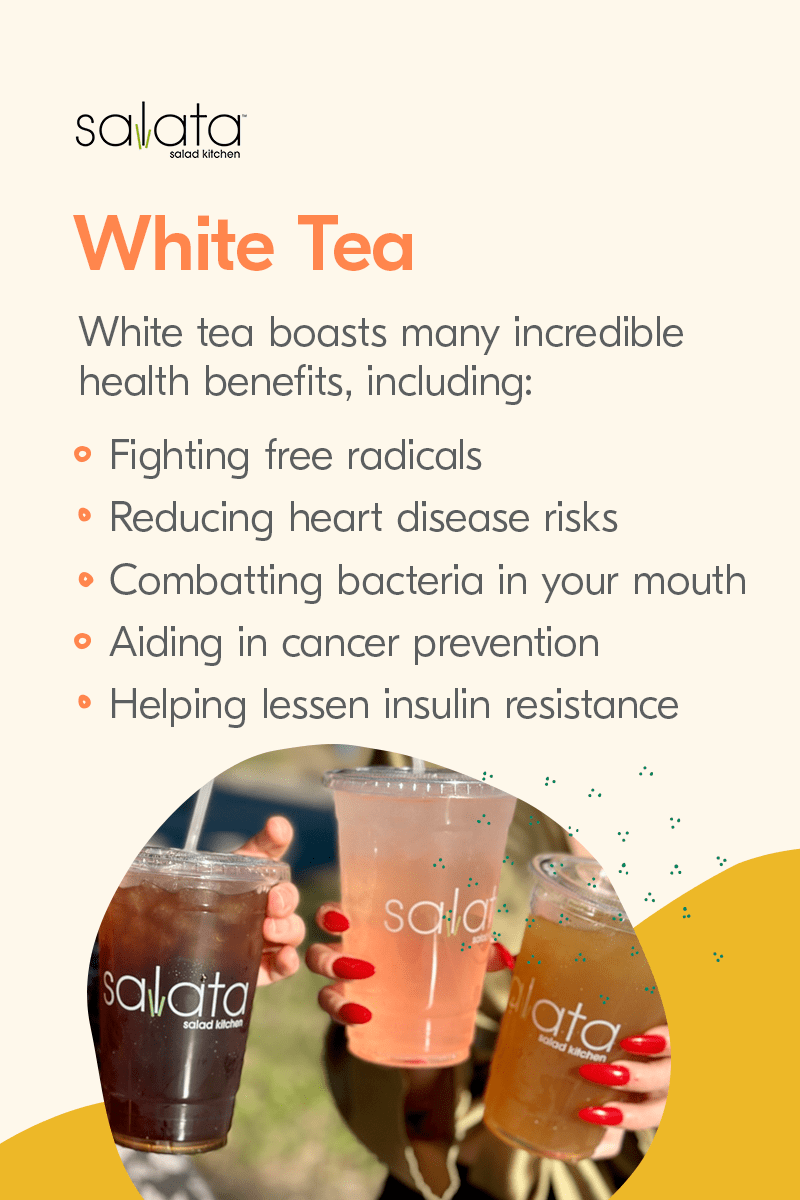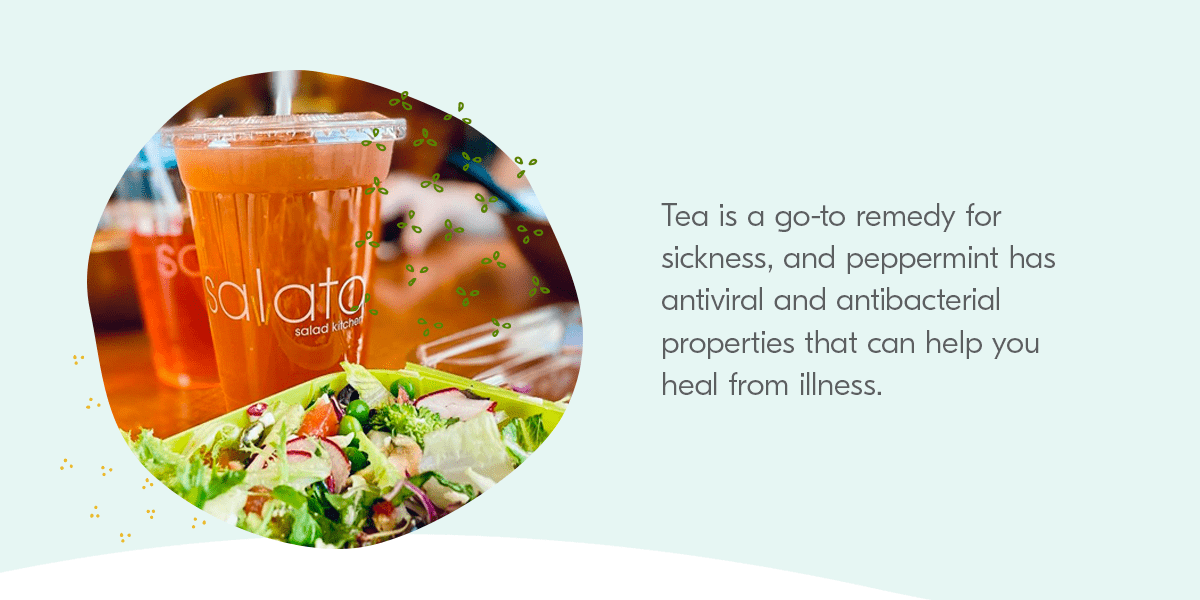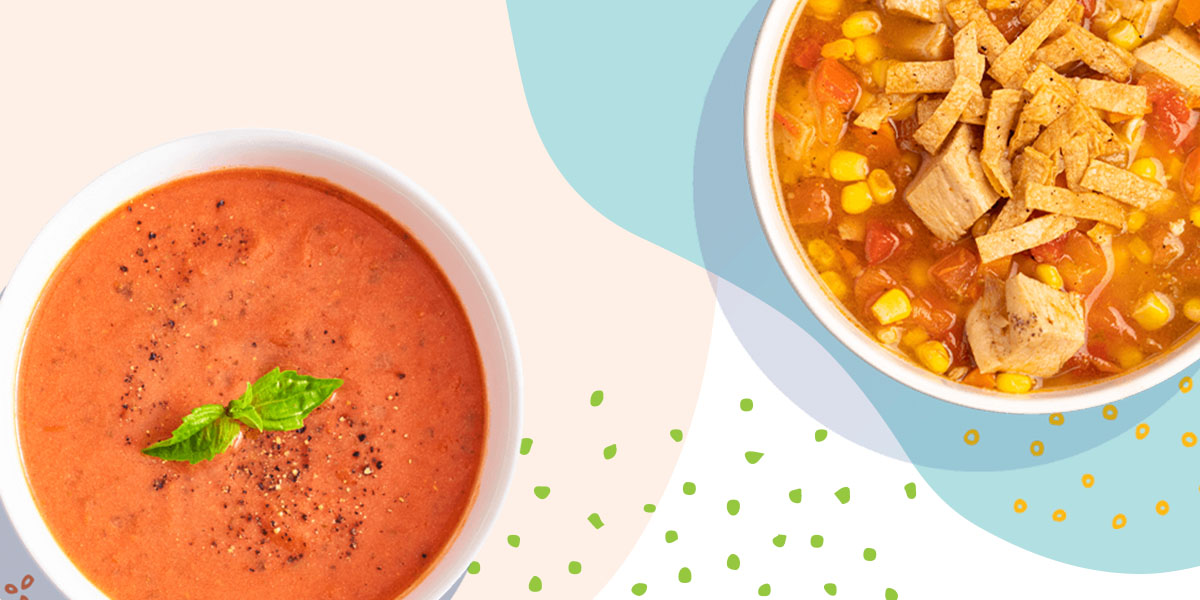The Unexpected Health Benefits of Drinking Tea
Tea is one of the most popular beverages consumed by people all around the globe. Since ancient times, communities have turned to this drink for its healing and soothing properties.
Today, you can find many different types of tea with varying levels of caffeine, different tastes and unique health benefits. From improving sleep to fighting cancer, you may be surprised by the perks of drinking tea regularly.
We are breaking down why people drink tea and the health benefits of a few different types of tea.
Health Benefits of Drinking Tea
Each type of tea yields its own special properties and impacts your health in distinct ways. Explore the following tea variations and how they can improve how your body functions:
Green Tea
Like oolong and black teas, green tea comes from a plant called Camellia sinensis. The key difference between all three is how the plant is prepared. With green tea, the leaves are steamed and fried before being dried out. Green tea originated in East Asia, where its healing properties were first discovered.
Check out some of the potential health benefits of drinking green tea:
- Improving cognitive function: Green tea contains caffeine. Since it is a natural stimulant, it can effectively help boost brain function. It is also known to enhance moods and mental alertness for some people.
- Aiding digestion: Another perk of drinking green tea is its rich polyphenol content. Polyphenols directly improve how your body digests food and can help fight inflammation in your gastrointestinal tract.
- Fighting illness: A chemical compound in green tea called epigallocatechin-3-gallate (EGCG) can potentially help those who consume it combat health conditions, including different cancers and heart disease.
You can order a refreshing Organic Tropical Green Tea at Salata Salad Kitchen. Its low caffeine content and light citrusy taste pair perfectly with a delicious salad, wrap or soup.

White Tea
Like green tea, white tea comes from the Camellia sinensis plant. It is widely known as the least processed type of tea because the leaves are harvested and solely air-dried before packaging.
White tea boasts many incredible health benefits, including:
- Fighting free radicals: Because white tea is antioxidant-rich, drinking it can effectively help you bad suppress and fight free radicals. When left unchecked, free radicals could become connected to diseases like cancer, cataracts and cardiovascular disease.
- Reducing heart disease risks: Polyphenols in white tea are thought to combat heart disease in a few ways. In addition to relaxing the blood vessels, these molecules can help control bad cholesterol, which can reduce the risk of heart disease.
- Combatting bacteria in your mouth: White tea contains fluoride, which plays a key role in preventing dental cavities. It can help your teeth resist bacteria, acid and sugar that wreak havoc on your pearly whites.
- Aiding in cancer prevention: Another advantage of drinking white tea is its anti-cancer properties. Studies show that this type of tea may fight lung and colon cancer cells.
- Helping lessen insulin resistance: Insulin resistance can lead to a range of different health concerns. The polyphenols in white tea are thought to boost the effects of insulin in the body.
Black Tea
Black tea is also from the Camellia sinensis plant. Unlike green and white teas, it is fully fermented. The results are a dark, reddish-colored tea with a bolder flavor. Black tea is the most popular type of tea in the world — for many different reasons. For one, it can help your body improve various functions, from digestion to immunity. Explore more of the leading health benefits of drinking black tea regularly:
- Boosting alertness: Black tea contains caffeine and amino acids, two elements that work together to improve energy and focus. It is even thought to help aid memory and executive function.
- Fighting stroke risks: Studies show that those who drink at least two cups of black tea every day have a 16% lower risk of stroke than those who do not.
- Improving heart health: Black tea has two components — theaflavins and flavonoids — that help your heart combat issues such as high blood pressure, heart disease and heart attacks.
- Combatting some cancer types: The polyphenols in black tea help the body fight off certain cancers, namely squamous cell carcinoma skin cancer.
Salata’s Organic Black China Tea features a mild, aromatic flavor with a touch of sweetness. This delicious drink contains caffeine, making it a great option for an early lunch or an afternoon pick-me-up.
Cinnamon Tea
Cinnamon tea is a unique type of tea with a sweet taste that is typically made by steeping cinnamon sticks in water.
Cinnamon for this tea comes from the inner bark of various kinds of trees. As it dries, the bark rolls into what we know as cinnamon sticks.
Drinking this type of tea can be beneficial for your health for a few different reasons. It is loaded with antioxidants that help the body combat free radicals that lead to concerns, such as the following:
- Heart disease
- Cancer
- Diabetes
Antioxidants in cinnamon can also provide anti-inflammatory properties.
Cinnamon is also thought to increase good cholesterol levels in the blood vessels, helping to boost heart health. Cassia cinnamon, a type that is known for its strong flavor, helps fight blood clots by preventing the blood vessels from narrowing.
A surprising health benefit of cinnamon is that it acts similarly to insulin in the body and helps lower blood sugar levels, giving it antidiabetic effects.
The Organic Plum Cinnamon Tea from Salata is delicious and sweet, striking the perfect balance between natural plum and cinnamon flavors. This tea also contains caffeine to give you a small energy boost.
Matcha Tea
Matcha tea has increasingly become more popular over the last decade. It is a type of green tea made from special shade-grown Camellia sinensis leaves and has a striking bright green appearance.
Producers grind these leaves into a very fine powder to prepare them for consumption. Because of how it is made, matcha has more antioxidants and caffeine in it than typical green tea.
Check out some of the health benefits of drinking matcha tea:
- Enhance cognitive function: Studies show matcha tea can help improve concentration and brain function, particularly in older individuals. The caffeine in matcha can also provide a feeling of alertness.
- Fight free radicals: Matcha tea features high levels of catechins. These compounds are natural antioxidants and help your body combat damaging free radicals that can lead to chronic disease.
Many people swap out their daily cup of coffee for matcha tea because the L-theanine in matcha changes how caffeine impacts the body. It helps slow the release and combat energy crashes.

Ginger Tea
Ginger tea also features impressive health benefits. As far back as ancient times, ginger has been a go-to ingredient for wellness purposes.
You can make ginger tea by peeling its root and boiling it in water. Shogaols and gingerols are the two key compounds in the ginger root that play an important role in helping your body feel its best.
Some of the potential health benefits of drinking ginger tea include:
- Nausea relief: Ginger tea can improve digestion and ultimately provide some relief for nausea caused by anything from carsickness to pregnancy to chemotherapy.
- Supports heart health: Consuming ginger tea daily may help support heart health in a few different ways, including lowering cholesterol and blood pressure.
- Cancer-combatting properties: Shogaols and gingerols in ginger tea can help fight certain cancer cell growth, including lung, ovarian and prostate cancers.
- Brain support: The same compounds in ginger that help the body fight cancer also provide support to important brain functions. Ginger is also thought to reduce inflammation and oxidative stress that can lead to degenerative diseases like Alzheimer’s.
Chamomile Tea
Chamomile tea has some of the most impressive and extensive health benefits. This type of tea is made from the chamomile plant, a small flowering plant that looks like a daisy. Its taste is light and mildly sweet.
Chamomile features an antioxidant called apigenin that can promote tiredness and help with some sleep issues. It is best to consume this type of tea later in the day, ideally around bedtime.
Some additional health benefits of drinking chamomile tea include the following:
- Easing inflammation: Apigenin, the same antioxidant in chamomile that can make you feel sleepy, is thought to help reduce inflammation and its associated risks in the body.
- Targeting cancer cells: Chamomile tea has compounds in it that may slow or prevent the growth of certain types of cancer cells.
- Soothing skin conditions: Because chamomile tea has anti-inflammatory and antimicrobial properties, it is thought to help soothe mild skin conditions like acne.
Peppermint Tea
Peppermint tea can provide many unique and special health benefits, from fresher breath to easier digestion. To make this type of tea, the peppermint leaves are steeped in hot water until they become fragrant.
Those who drink peppermint tea can enjoy many health benefits. Peppermint tea can:
- Aid digestion: Peppermint is often used to ease digestive symptoms, from bloating to irritable bowel syndrome (IBS).
- Soothe clogged sinuses: Among the greatest benefits of peppermint tea is its antibacterial and antiviral properties that can relieve clogged sinuses and promote better breathing.
- Ease headaches: The menthol in peppermint boosts blood flow and can help with certain kinds of migraines and tension headaches.
- Relax muscles: Peppermint tea can help relieve cramps and soreness by relaxing the muscles. It is also known to alleviate some related menstrual symptoms.
Hibiscus Tea
Hibiscus tea is a delicious and bold type of tea that can provide various health benefits. The dried hibiscus flowers are steeped in water until the tea has a deep red color. It is sweet and slightly tart, tasting similar to cranberry juice.
Explore the following ways hibiscus tea can support your health:
- Fight free radicals: Hibiscus plants are antioxidant-rich and can help your body combat harmful free radicals that can lead to health concerns such as cancer and diabetes.
- Lower blood pressure: Another health benefit of drinking hibiscus tea is its potential to lower your blood pressure.
- Support liver health: Hibiscus tea is rich in antioxidants. Drinking it regularly could help support your liver health. Healthy liver function can promote the flushing away of different toxins and improve blood sugar regulation.
Health Benefits of Tea FAQ
Now that we’ve covered the health benefits of different types of tea, let’s explore some of the most commonly asked questions about the subject:
Is Tea Healthier Than Coffee?
It’s a classic rivalry: coffee vs. tea. People get very passionate about their preferences, but is one really healthier than the other? The answer depends on a few factors, including what you add to your cup and the caffeine content. For example, plain tea may be a healthier daily option than sugary coffee. Additionally, if you’re sensitive to caffeine, tea may be a better beverage for you.
Ultimately, both beverages share many health benefits — it all comes down to your preferences!

Which Type of Tea Is Best for Illness?
When you’re battling a sore throat or a cold, prepare yourself a mug of peppermint tea. Tea is a go-to remedy for sickness, and peppermint has antiviral and antibacterial properties that can help you heal from illness. It can also help manage different ailments, such as nasal congestion or a mild fever.
When’s the Best Time to Drink Tea?
Some tea drinkers would argue that nighttime is the best time to grab a mug, while others swear nothing is better than a morning cup. Consider these factors when deciding the best time for you:
- Time of day and caffeine content: Drinking caffeinated tea close to bedtime can impact your sleep quality. However, drinking caffeinated tea in the morning can give you the boost you need before school or work. Likewise, a sleepytime tea in the evening may relax you for slumber.
- What you’ve eaten: You may want to avoid drinking tea on an empty stomach, especially if it is highly caffeinated.
What Happens When You Drink Tea Every Day?
Drinking tea every day — around two to three cups — may lead to a reduced risk of:
- Heart disease.
- Type 2 diabetes.
- Stroke.
As with most things in life, moderation is key. Drinking too much tea can potentially cause headaches and leave you feeling anxious.
Which Tea Has the Most Health Benefits?
Green tea is widely understood as the tea with the most health benefits. From aiding in weight loss to fighting free radicals that harm our body’s cells, this tasty drink offers more than just deliciousness.
If you are looking for a go-to tea option to optimize your wellness, consider turning to green tea options. You can enjoy it hot or iced — depending on your personal preferences — and still get all the perks.

Order a Refreshing Iced Tea From Salata Now
When you want healthy, fresh ingredients and a wide selection of fully customizable meal options, turn to the Salata menu. With more than 50 toppings and many signature dressing options, you can tailor your salad or wrap to your unique taste buds.
In addition to ordering a delicious and nutritious meal, we have a selection of refreshing and delectable iced teas to choose from, including Black China Tea, Plum Cinnamon Tea and Tropical Green Tea.
Ready to quench your thirst? Find a Salata location near you today, and order your next healthy meal from your kitchen away from home.



Comments